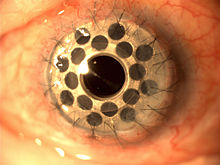After a corneal transplant, there is a chance of corneal rejection, however this is rather uncommon. When the body’s immune system perceives a transplanted cornea as foreign and develops an immunological response against it, corneal rejection results. However, there are steps that medical professionals can take to lessen corneal rejection. Your doctor may treat this issue in the following ways:
1. HLA (human leukocyte antigen) compatibility of donor tissue: Your doctor will carefully match the donor cornea with your own cornea based on variables such blood type, tissue type, and HLA compatibility. Rejection risk is decreased when donor tissue and your own tissue are as similar as feasible.
2. Drugs: To reduce the immune response and avoid rejection, your doctor may give immunosuppressive drugs such corticosteroid eye drops. To reduce the chance of rejection, these drugs are often started prior to surgery and continued for a while after the transplant.
3. Monitoring: Your doctor will check on the stability and health of the transplanted cornea at routine follow-up visits after the operation. This entails looking for indications of rejection such swelling, discomfort, throbbing, or increased redness. Prompt action is made possible by early rejection detection.
4. Medication compliance: It’s important to comply to your doctor’s recommendations for the usage of prescribed drugs, including the quantity and schedule of eye drops. Immunosuppressive drugs should be used consistently and correctly to lower the risk of rejection and maintain the integrity of the transplanted cornea.
5. Information and awareness: Your physician will enlighten and educate you regarding the warning signs and symptoms of corneal rejection. They will give you advice on what to watch out for and when to seek emergency medical help if you think there might be issues or rejection.
It is crucial to remember that corneal rejection can still happen in some situations despite these preventative steps. However, effective management and treatment of rejection episodes can frequently be achieved with early detection and prompt action. Your doctor will keep a close eye on how you’re doing, change your meds as needed, and offer the right care if you have rejection.
At The Eye Center- Dr. Mahnaz Naveed Shah & Associates our team of eight ophthalmology subspecialists/ eye specialists, eye surgeons who are considered amongst the very best eye specialists in Karachi and in Pakistan, have the diagnostic and treatment capabilities to treat from the simplest to the most complex patients. We work hard to provide our patients with the best possible medical and surgical eye care, in a state of the art purpose built eye care facility. We offer the entire array of medical, laser and surgical treatments to help provide patients the best possible care in the most efficient, safe and ethical manner.
If you need an appointment, please contact us at 03041119544 during our working hours or leave us a WhatsApp message at +923028291799 and someone will connect with you. Walk-in appointments are also available for emergencies. We can also be reached through our web portal on www.surgicaleyecenter.org

